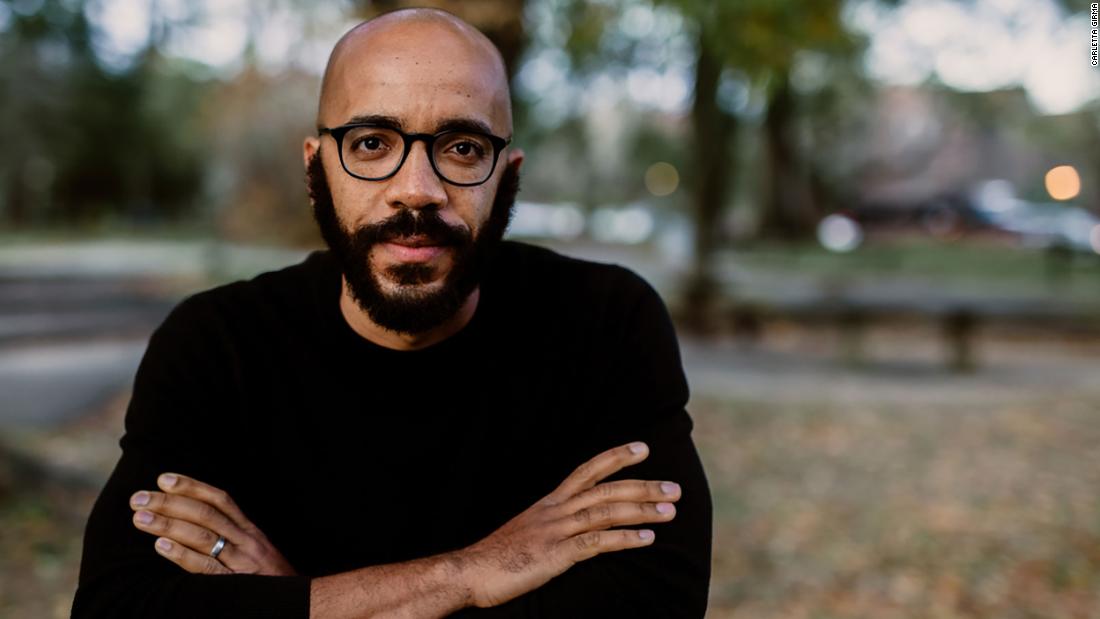
What they might not know? On Sundays, Smith makes French toast.
He gathers the eggs, the bread, the sugar and cinnamon. His two kids, a 5-year-old son and 4-year-old daughter, stand on stools next to him, pajama sleeves rolled up, shouting ingredients they know from memory. Eventually, though a few pieces may burn, breakfast is served.
This is just one of the many family scenes painted in Smith’s newest book, “Above Ground,” a collection of poetry meditating on fatherhood and documenting all the moments of joy and grief along the way. Out Tuesday, the collection is Smith’s second volume of poetry and his first book since the breakaway success of 2021’s “How the Word Is Passed,” a narrative look at the history of slavery in the United States.

“Above Ground” is Smith’s second book of poetry. Credit: Courtesy Little, Brown and Company
At times, his latest work reads almost like a letter to his children, referring to them simply as “you.” The reader is offered a peek into this intimacy, in a style akin to Ta-Nehisi Coates’ “Between the World and Me.”
“And when you finally / reach my arms I fall / back and you fall on / top of me and we roll,” Smith details in “Ode to the Bear Hug.”
“I just wanted to write into a book that thinks about how joy and wonder and awe exist alongside fear, despair and catastrophe,” Smith told CNN. “It’s not a question of just picking one, or just pretending as if one part of that exists. It’s all of it. Our lives are filled with all of it.”
Despite moves toward nonfiction writing, poetry is his literary North Star, Smith said — it guides his writing, regardless of genre. And it’s through poems that Smith holds onto singular moments or images; poetry becomes his archive.
It’s natural, then, that this collection is so focused on family. He began writing this set of poems in 2016, when his wife became pregnant with their firstborn. As the years went on, the poems became a way for him to trace his emotional space during the first few years of their children’s lives.
Early poems describe doctor visits and witnessing a baby kick over FaceTime; they go on to narrate toddler school over Zoom and, of course, making French toast. As the page numbers of the book grow, so do the children. Readers see them through Smith’s eyes, with reminders of the outside world sprinkled in between: a grandfather aging, a coastline disappearing.
“Poetry at its best is something that ensures that I’m paying attention to the world,” Smith said. “And since my kids have come into the world, they are the people most of all who I want to ensure that I’m paying attention to.”
Fatherhood hasn’t only impacted his poetry, it’s influenced his more academic work, too. When writing “How the Word Is Passed,” Smith thought a lot about children in the context of slavery. The horrors of slavery, so often, are thought of as only physical. It wasn’t until Smith had children of his own that he understood the brutality of family separation, of waking up and finding your kids, or any family member, gone — not knowing if you would ever see them again.
That fear now felt unimaginable, and yet it was the reality of millions of enslaved people.
Dancing with his kids in the kitchen, visiting a park playground, playing tag in the backyard — all of this, Smith said, is only possible because generations of people struggled through that reality and actively fought against it. Documenting the lighter moments is just as important as documenting the trauma, he said.
“We have to take seriously the violence,” Smith said. “But we also have to remind ourselves of how we are not singularly defined by that history.”
The world, after all, is full of despair. News of climate catastrophe, war, racist violence. Over the last several years, Smith has known it well. And yet, at the same time, there’s so much to be grateful for, he said.
Even the seemingly mundane. A bear hug. A breakfast tradition. In the end, Smith said, they’re what make life worth it.